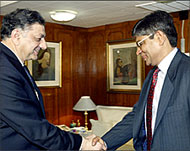Kashmir talks likely to be delayed
The third round of talks between India’s federal government and an umbrella organisation of separatist Kashmiri political parties is likely to be delayed by several weeks.

The delay is expected on account of the Hurriyat Conference’s decision to launch a fresh bid to join up with its breakaway faction.
As a first step in the reconciliation process, Shia cleric and politician Moulvi Abbas Ansari has stepped down as chairman of the moderate faction of the Hurriyat Conference, which held two rounds of peace talks with New Delhi earlier this year.
The third round was scheduled to take place in the last week of June, but the political changeover in India following the general election delayed the resumption of the talks.
Subsequently India‘s new interior minister, Shivraj Patil, invited the separatist organisation’s moderate faction to “open talks” on a mutually agreed upon date.
The daunting task of uniting the two factions has been given to Mirwaiz Umar Farooq, the 32-year-old chief Muslim cleric of Kashmir and founder-chairman of the Hurriyat Conference.
“I will do my best to bring the disgruntled comrades back into the Hurriyat Conference fold,” he said.
The Hurriyat Conference has insisted that its leadership will hold talks only at the “highest level”, and going by reports New Delhi has agreed in principle to an initial session between the organisation’s delegates and the Indian prime minister, Manmohan Singh.
This would be followed by wide-ranging discussions between the Hurriyat team and Interior Minister Patil and N. N. Vohra, the Indian government’s interlocutor on Kashmir.
‘In one voice’
On Wednesday, Mirwaiz Umar confirmed the news of Ansari’s resignation from the organisation’s top post, but said that he had not agreed to the latter’s suggestion that he serve as the working head till a new chairman is elected.
 |
|
Indo-Pak dialogue has improved |
Earlier in the day, Moulvi Abbas announced his decision at the Hurriyat Conference’s executive committee meeting in Srinagar.
Mirwaiz Umar said now that India and Pakistan are ready to bury the hatchet and have started to sit down at the negotiating table to resolve their disputes, “why should the people of Kashmir remain at loggerheads?”
“We’ll hold talks with the Indian government and try to find an amicable way out but only after we have united,” he said.
According to Mirwaiz Umar, for the time being the separatist body’s highest decision-making body – the central executive – will run its day-to-day affairs in the absence of a chairman.
“For now, I would personally meet and talk to each disgruntled member. I’ll tell them that the time has come when we all must talk in one voice.”
‘Sincere effort’
At the Hurriyat Conference’s executive committee meeting, Moulvi Abbas said, “I have made an all-out sincere effort for unity. I thought if I am, for one reason or the other, considered an obstacle in the unity effort, I must quit at once.”
He was elected to the chairman’s post for a term of four years in August last year.
|
“I will do my best to bring the disgruntled comrades back into the Hurriyat Conference fold” Mirwaiz Umar Farooq, |
Although Moulvi Abbas had signalled his intention to quit at a rally held beside the “martyrs cemetery” in Srinagar on May 21, he took the final decision only after Mirwaiz Umar, Syed Ali Shah Geelani, the leader of the breakaway Hurriyat faction, and two other prominent separatist leaders met with the visiting Pakistani foreign secretary, Riyaz Khokar, in New Delhi.
Hurriyat Conference, originally an amalgam of 23 separatist parties, split last year when the moderates decided to enter into negotiations with the Indian government.
Syed Geelani, a hardliner, objected to the move, saying he doubted if dialogue between Kashmiri separatists and the Indian federal government would succeed without Pakistan‘s involvement.